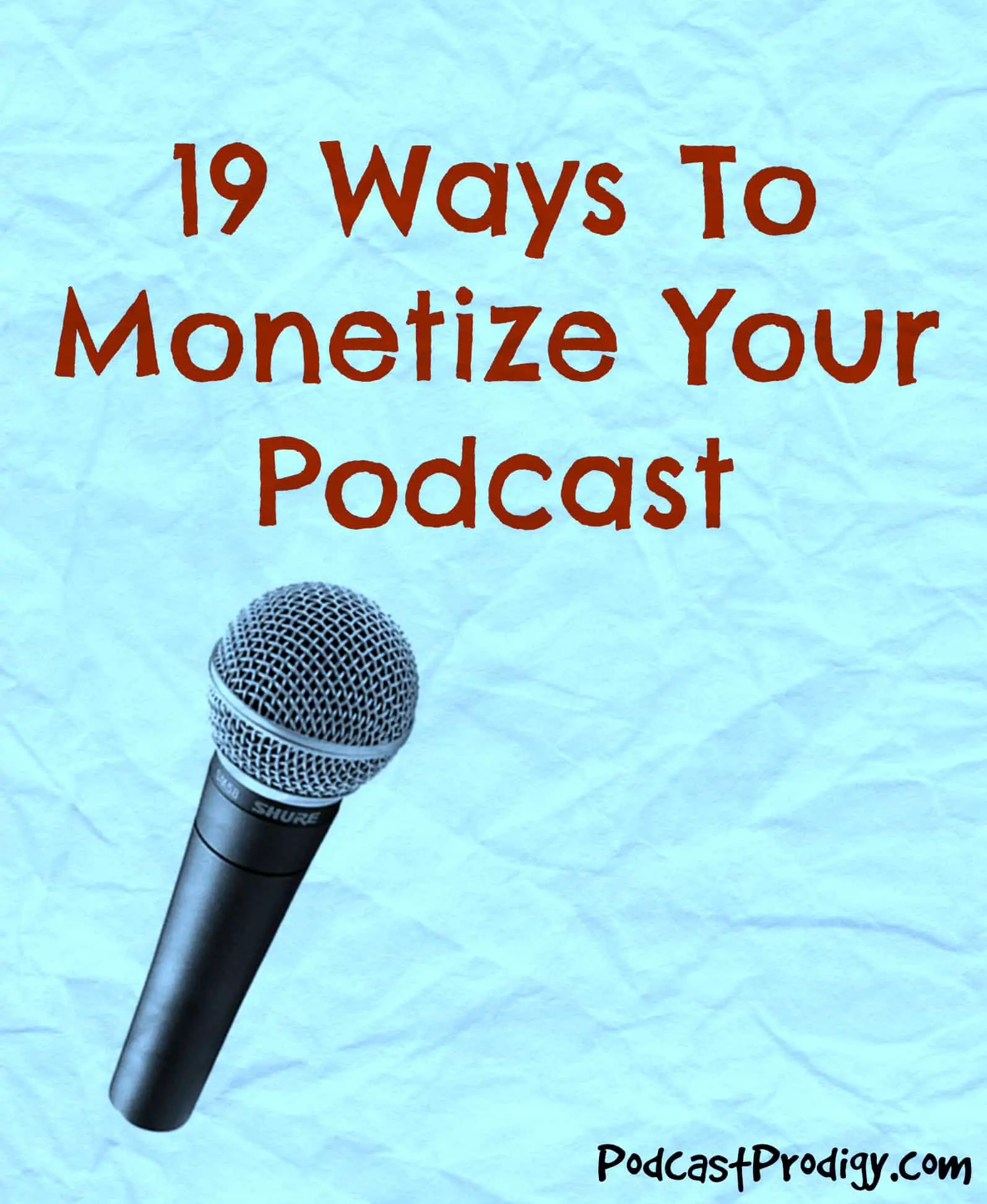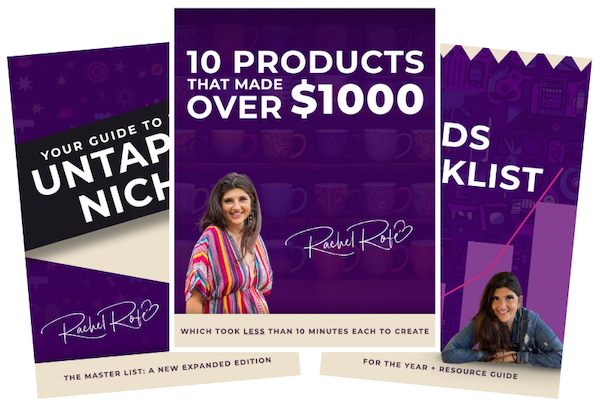Podcast: Play in new window | Download
 One thing that eludes a lot of people in the podcasting world is how to actually make money from their podcasts.
One thing that eludes a lot of people in the podcasting world is how to actually make money from their podcasts.
This is especially true for people who have a “passion” podcast, like I do, and didn’t start with any kind of monetization plan.
Thankfully, I’ve been interviewing a lot of spectacular people for my Podcast Prodigy course and have gotten some awesome ideas on how to monetize your podcast.
Here are 19 of my favorites:
1. Sell sponsorships.
This is a very popular option for many podcasters.
If you have a good amount of downloads per podcast episode (John Lee Dumas of Entrepreneur On Fire tells me that the sweet spot for attracting sponsors is 3,000 downloads per episode), you can sell ad space to sponsors.
2. Find coaching clients.
I was recently talking to Michelle Evans of the Breaking Free podcast. She told me that even though her podcast has been around for less than a year, she gets between 4 and 15 emails every week from people who are interested in hiring her. About 70% of those people go on to become clients. Not shabby.
3. Promote a membership site.
I recently interviewed Don McAllister for my Podcast Prodigy course. He told me that he has “several thousand” members in his Screencasts Online membership and that the overwhelming majority of his traffic came from his podcast.
4. Build a mailing list.
Offer some kind of gift to entice your podcast audience into signing up.
Even if you don’t have something to sell them right now, creating a list is a very powerful monetization method for down the line. You can use it to sell affiliate products, your own products or services, or even just tell people about new episodes so you can build your numbers up for sponsorships.
If you use EasyAudello, you can even have opt-in forms show up during different points of your podcast – i.e., in minute 3, at the same time you mention a gift that people can get for signing up.
5. Sell services.
Denise Griffitts’ show, Your Partner In Success, gets between 4,000 – 6,000 listens a week. While she doesn’t directly try to monetize it, she tells me that many people reach out to her and inquire about hiring her for her web development and/or virtual assistant services.
6. Sell mastermind slots.
If people are interested in your podcast topic, it likely means they want to hear more about it. Create a mastermind of likeminded individuals who want to learn even more about your show topic and/or get individual support.
7. Create information products to sell.
Survey your audience and find out what they’d like to learn more about, then create products to serve them.
When I interviewed John Lee Dumas, he told me that he created his premium course after getting feedback from his audience that they’d be interested in learning more.
To date, he has sold well over a million dollars with that product.
9. Sell books.
In many ways, selling books is harder than ever. There are more and more authors entering Kindle by the day.
If you build a relationship with your book readers via podcasting, you create an excellent way to stand out from everyone else.
A few months ago, I interviewed a gal who said that her key to Kindle success (she’s currently making $80k/month+ with her books and became a NY Times Bestseller – starting from scratch, with zero list) was having consistent communication and interaction with her book readers.
Podcasting is an excellent way to cultivate a relationship and build a loyal following of people who want to buy your books.
10. Sell products as an affiliate.
There are many ways you can promote products as an affiliate with your podcast.
For example, if it makes sense, Audible has a partner program where they pay you $15 per person who signs up for a free trial account.
11. Have affiliates come on and sell products.
You can interview people on your podcast and then have them offer special discounts (with your affiliate code) to your audience at the end of the interview.
12. Ask for donations.
Before Don McAllister (see #3) created his membership site, people were contacting him and asking how they could donate for his efforts. If you directly ask for donations, it’s very likely that you will get some.
13. Give some content away for free, charge for the rest.
There are a few podcasts – Don’s included – where the host gives away some content, such as the first few minutes of a tutorial (which is still helpful), then people need to pay an upgrade fee to get the rest.
14. Build your brand.
Even if you don’t directly sell something, you can raise your perceived value by aligning yourself with experts.
In this interview, John Jantsch says that he was a “complete unknown” when he started podcasting. That didn’t stop him from asking people like Seth Godin to be on his podcast though.
From the interview: “Since starting the podcast, things have changed dramatically. Jantsch estimates that his business has grown more than 500 percent and he works a lot less.”
15. Sell an iPhone app.
In this interview, Elsie Escobar of “Elsie’s Yoga Class Live and Unplugged” explained how her podcasts offers free yoga classes. She sells an app for $3.99 on that podcast.
When people buy the app, they get anytime access to 70+ yoga classes as well as PDF’s that show the sequence of each class.
16. Repurpose content and sell it.
With some finesse, you can take podcast posts and put them into a book or ebook.
As an example, Nick Loper made money from a podcast that he didn’t even host. (Crazy, right?)
He simply went through 500+ previous episodes of John Lee Dumas’ Entrepreneur on Fire and compiled a listing of the interviewee’s favorite books. (John asks every guest what their favorite book is.)
His book (Work Smarter) became a bestselling book.
17. Brag about your numbers.
If you’re getting great download numbers, you can leverage them when trying to land traditional publishing deals, get sponsorships for events, or book paid speaking gigs.
18. Host an event.
Identify the type of people who you want to attract to your events, then create content that they would respond to.
In your podcasts, mention the (online or offline) events you’ll be holding.
19. Sell physical products.
Onnit, a supplement company, is a big sponsor for some very popular podcasts. If they’re continuing to sponsor, they must be making money doing it. What’s to stop you from selling your own physical product?
And if you’d like to learn more about podcasting, please check out Podcast Prodigy.




22 thoughts on “19 Ways To Monetize Your Podcast”
Thanks FOR the great information. Is this current for 2020?
Hey Joe, Many of the suggestions still apply and are relevant, but the post had not been updated since it was first published. Thanks!
Hey Rachel, thanks for sharing.
I’d love to interview you on my PODCAST? If this is something that interests you, kindly send me an email anajembak@gmail.com or reach me WhatsApp +2348094165089.
Thank you
Thanks so much for getting in touch. With all of the holiday craziness going on, I don’t really have time for interviews. But thanks again for your interest!
Nice to know! thank you so much for the details!
I HAVE A PATRON SITE ON MY PODBEAN SITE – OUTSIDE THE CUBICLE FOR MONTHS NOW AND NO ONE – I MEAN NO ONE RESPONDS ?(
I am very much pleased with the contents you have mentioned.I wanted to thank you for this great podcast.I enjoyed every little bit part of it and I will be waiting for the new updates.
Hi Rachel
Those are great inputs on monetizing podcasts. I have finally started podcasting but still have loads of questions unanswered. Can I connect with you through ur E-mail.
Thank you
Tulika B Mukherjee
Hi Rachel!
You got a nice blog going on! … awesome awesome! :)
I’m also starting to do more Podcast shows to promote my internet marketing blog – and I am still learning here! lol
You shared some valuable tips to help monetize a podcast show. Thanks for sharing your knowledge!!
Keep up the great work!
I wish you the best!
Cheers! :D
Thank you very much! Podcasting is awesome. I can’t recommend it enough, and it was my pleasure to write the article. :) Thanks for taking the time to leave a comment!
Hi Rachel,
Great post and ideas to monetize a podcast. It’s refreshing to know that there other ways to make money from a podcast than just having sponsors in the show. I do have a couple of questions though:
1) Regarding tip #16, how does Nick not get sued for copyright infringement, if he’s using content from other podcast? I’ve actually thought of doing the same in the past, but didn’t because of copyright reasons. Did he get permission from John Lee Dumas first, or did he just combined the content into a readable format and sell it without asking?
2) Regarding tip #12, how does one donate to a podcast? Would it be through Paypal and does the host mention it in the show on where to go to donate? Are there other platforms to use, other than Paypal, to make donations?
Thanks and keep up the good work!
Warren
Hi Warren, thanks for your kind words!
1) I remember reading somewhere that Nick did get permission from John first. :)
2. There are a few sites that do this. One is GetJoyride.com. Yes, the host would mention on the show and on show notes. :)
Hi Rachel,
Thanks for sharing these insights on how to monetize a podcast.
Frankly, I have few ideas on how these can be done but I can see from this post that there are great many practical options.
It sure would be exciting to put into practice any of these.
I sure have downloaded the PDF format for future reference!
I have shared this comment in kingged.com where I stumbled upon this post
Awesome, Sunday! Thank you for sharing and I am glad this helped. :)
thanks I purchased your course and have so many plans to use it to promote all my stuff. Thank you so much for your insight.
Thanks, Rick! I put a ton of heart into that product and hope it helps you a lot. Thanks for leaving a comment!
Hi Rachel. Thanks so much for this post. Podcasting is on my ‘learn to do in 2015’ list, so this was very timely for me. I appreciate your offering the free PDF, as well. That is a nice touch.
All the best,
Leslie
Awesome, Leslie! Thanks for taking a moment to leave a comment and I’m glad this helped!
Thank you Rachel! I asked you this question in a personal email, and then the next thing I know, this article came to my inbox. Great info.
Thanks, Kristin! I should have pointed you to this article when I replied, so I’m glad you saw this. ;)
#4 on here is my favorite. It as to be the toughest on the entire list, but the most sound when it comes to growing your brand.. And it would impact the rest of this list!
Keep it up Rachel.
– Jeremy
Yeah, that’s a great point, Jeremy! Thanks for taking the time to comment. :)